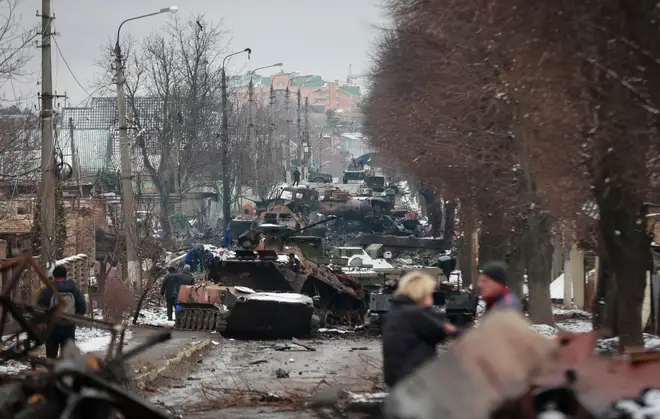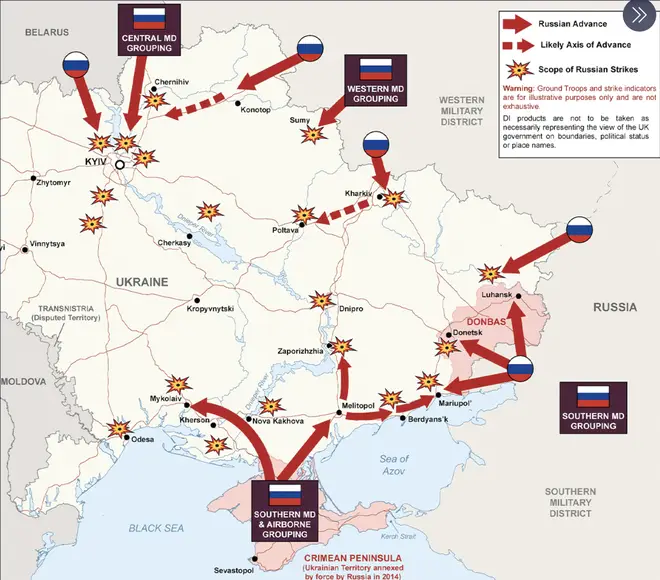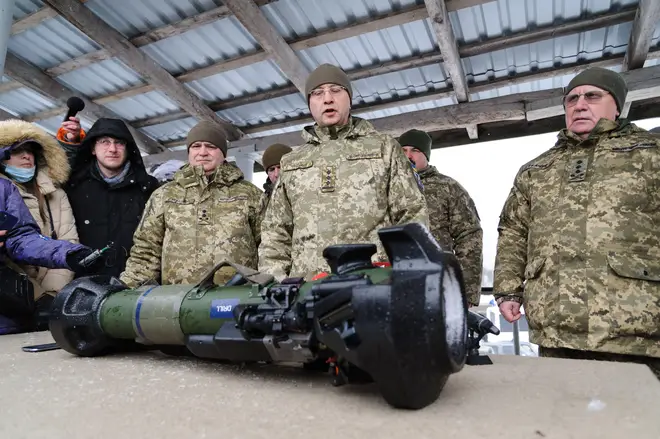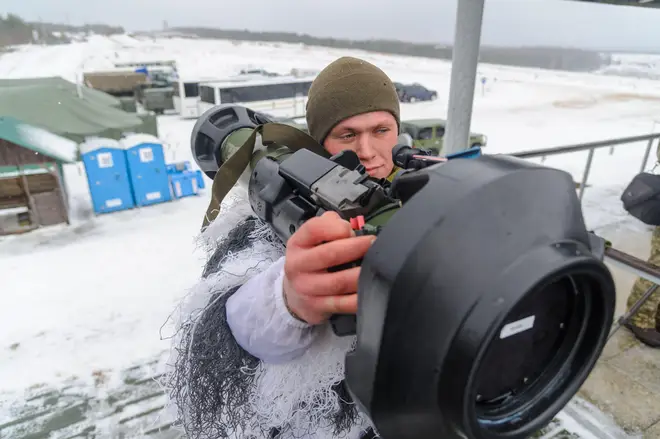
Nick Abbot 10pm - 2am
2 March 2022, 10:54 | Updated: 2 March 2022, 13:24

Ukrainian troops ambushed a Russian convoy 20 miles from Kyiv, wiping out dozens of vehicles using anti-tank rocket launchers supplied by Britain.
The remains of the Russian military convoy blocked a street in the town of Bucha after the ambush - said to have been carried out by troops armed with NLAW missile launchers.
Artillery and drone strikes are also thought to have been deployed in the attack. Locals civilians are also reported to have helped fight the invaders by throwing petrol bombs.
Not far from Bucha, Ukrainian forces used Western-supplied anti-tank missiles to destroy another Russian convoy on a bridge that serves a main route into Kyiv.
A Russian column was obliterated and corpses were seen lying beside the road.
Ukrainian officials told CNN that they were “enthused by the victory on the bridge”.
In January, Britain sent 2,000 of the anti-tank weapons to Ukraine and it is understood more of them have since been sent to the country.
Ukrainian troops equipped with some of the Anglo-Swedish Next-generation Light Anti-tank Weapons (NLAW) launchers attacked the convoy of Russian armour.
Read more: Russian paratroopers land in Kharkiv after city is blitzed by rocket attacks
Read more: 'I'm not afraid of Putin': Defence Sec says Ukraine no-fly zone would lead to all-out war
It is not clear precisely when the ambush took place but pictures and video show the aftermath of the fighting with the burnt-out shells of multiple Russian armoured vehicles and supply trucks littering the streets of Bucha.
Several days ago Bucha’s Mayor Anatoli Fedoruk posted a video of the burned out military vehicles on the stretch of road, saying: “The armed forces of Ukraine stopped the enemy’s column on Vokzalnaya street in the city of Bucha.
"These are the results of their invasion. and the work of our armed forces.”
Буча💪💪💪 pic.twitter.com/HEc0NmGNxn
— Зла Бандерівка🇺🇦 (@zvirytko) February 27, 2022
Prior to Russia's invasion, it was reported the British Army sent paratroopers to train Ukrainian forces in operating the NLAWs. The weapons are launched from the shoulder and can be fired from confined spaces making them highly effective for ambush tactics.

Ukraine's Ambassador to London Vadym Prystaiko confirmed last week the anti-tank weaponry provided by the UK had been used to help defend against Russian forces.
Ukrainian troops have said the British NLAW missiles are a "game-changer" when they come up against Russian armour.

Last week Armed Forces minister James Heappey, said anti-tank missiles had "already proven to be invaluable" in the conflict in Ukraine.
Mr Heappey said the Government was "aware of the number of circumstances" in which the anti-tank missiles "have been used to defeat Russian armour".

Defence Secretary warns war in Ukraine will last "years"
"We are therefore very aware of their utility, both in open battle during the initial phase of the conflict, but also in the urban domain in any resistance or insurgency that might follow".
Sam Cranny-Evans, a research analyst at the Royal United Services Institute (Rusi), told Forces News the Javelin anti-tank guided missile and the NLAW would both be useful in combat in Ukraine.
"They're accurate out to 600m, potentially has a reach of up to 1km and it can be fired from within quite confined spaces," he said.
Ukraine's President Volodymyr Zelenskyy has said that Russia is trying to 'erase' Ukraine and its people.

He denounced Russia's escalation of attacks on crowded cities as a blatant terror campaign, and US president Joe Biden warned that if the Russian leader didn't "pay a price" for the invasion, the aggression would not stop with one country.
"Nobody will forgive. Nobody will forget," Ukraine's president Volodymyr Zelensky vowed after Tuesday's bloodshed on the central square in Kharkiv, the country's second-largest city, and the deadly bombing of a TV tower in Kyiv.
He called the attack on the square "frank, undisguised terror" and a war crime.
Ukraine said more than 2,000 civilians have been killed in attacks across the country.
A 40-mile convoy of hundreds of Russian tanks and other vehicles is advancing slowly on Kyiv.
The invading forces also pressed their assault on other towns and cities, including the strategic ports of Odesa and Mariupol in the south.
As the seventh day of the war dawned this morning, Russia found itself increasingly isolated, beset by sanctions that have thrown its economy into turmoil and left the country practically friendless, apart from a few nations like China, Belarus and North Korea.
Leading Russian bank Sberbank announced on Wednesday that it is pulling out of European markets amid the tightening Western sanctions.
As fighting raged, the humanitarian situation worsened.
Roughly 660,000 people have fled Ukraine, and countless others have taken shelter underground.
The death toll was less clear, with neither Russia nor Ukraine releasing the number of troops lost.
The UN human rights office said it has recorded 136 civilian deaths, though the actual toll is likely to be far higher.
One senior Western intelligence official estimated that 5,000 Russian soldiers had been captured or killed in the biggest ground war in Europe since the Second World War.
Many military experts say Russia may be shifting tactics. Moscow's strategy in Chechnya and Syria was to use artillery and air bombardments to pulverize cities and crush fighters' resolve.
The Ministry of Defence said it had seen an increase in Russian air and artillery strikes on populated urban areas over the past two days.
It also said Kharkiv and Mariupol were encircled by Russian forces and that troops had reportedly moved into the centre of a third city, Kherson.
Russia's defence ministry said it had seized Kherson, though the claim could not be confirmed.
Ukrainian authorities said five people were killed in the attack on the TV tower near central Kyiv.
A TV control room and power substation were hit, and at least some Ukrainian channels briefly stopped broadcasting, officials said.
Mr Zelensky's office reported that the site of the Babi Yar Holocaust memorial, which is adjacent to the TV tower, was also hit.
Russian defence ministry spokesman Igor Konashenkov claimed that the airstrike on the TV tower did not hit any residential buildings.
In Kharkiv, with a population of about 1.5 million, at least six people were killed when the region's administrative building on Freedom Square was hit in a missile strike.
The bombardment blew out windows and walls of buildings that ring the square, which was piled high with debris and dust. Inside one building, chunks of plaster were scattered, and doors lay across hallways.
Another Russian airstrike hit a residential area in the city of Zhytomyr.
Human Rights Watch said it documented a cluster bomb attack outside a hospital in Ukraine's east in recent days.
Residents also reported the use of such weapons in Kharkiv and Kiyanka village. The Kremlin denied using cluster bombs.
A senior US defence official has that Russia's military progress, including the massive convoy, has slowed, plagued by logistical and supply problems.
Some Russian military columns have run out of petrol and food, the official said, and morale has suffered as a result.
Overall, the Russian military has been stalled by fierce resistance on the ground and a surprising inability to completely dominate Ukraine's airspace.
The immense convoy, with vehicles packed together along narrow roads, would seemingly be "a big fat target" for Ukrainian forces, the senior Western intelligence official said.
But it also showed Russia was comfortable that they would not come attack by air, rocket or missile, the official said.